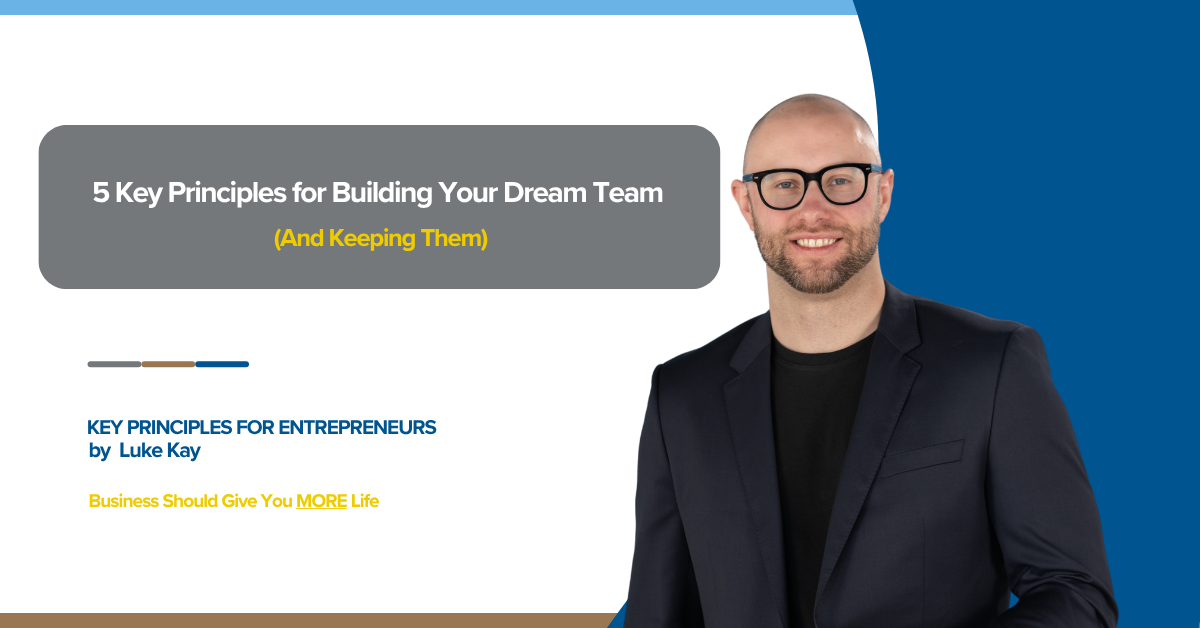
How to Attract, Align, and Retain the People Who’ll Help You Grow Your Business and Boost Profit
Let’s be honest, hiring people is the easy part.
When it comes down to it, keeping the right people is where most business owners struggle. Because a dream team doesn’t build itself. Having a top-tier team is not about luck or big salaries. Owning bragging rights to a top-tier team is not about luck or big salaries, and yes that helps, but it’s about having the right work culture, reliable and sustainable systems, and leadership in place to keep people connected, accountable, and aligned.
When you have the right team, the results are priceless:
- Less firefighting
- Better decision-making
- More trust, speed, and profit
This week I share a few tried and tested strategies for building your dream team, with real-life examples of successful businesses showing exactly how it’s done.
Let’s get into it.
Key Principle #1: Hire for Attitude, Train for Skill
Too many business owners hire employees based on experience and CVs alone, and then wonder why the new hire doesn’t work out.
Technical skills can be taught, but when it comes to attitude, energy, and mindset? If a candidate measures highly in these attributes, that’s what’s going to actually move your work culture forward.
Instead of asking, “Do they tick the boxes?” ask:
- “Will they show up hungry to learn?”
- “Are they aligned with our values?”
- “Will they bring positive energy into the team?”
When you get this right, your team becomes easier to manage and they grow with you.
Key Principle #1 Case Study: Mindful Chef
This UK meal kit brand focused on cultural fit from day one. Instead of chasing the most experienced hires, they built a team around shared values like health, integrity, and customer obsession. That early investment in culture helped them scale to over £50M in revenue and get acquired by Nestlé, without the usual scaling chaos.

Key Principle #2: Make Your Mission Matter
People don’t just want a job anymore.
They want purpose. They want to feel like the work they do means something, especially your top performers.
If your mission is just a line on the website, no one’s inspired. On the contrary, when you include the day-to-day roles to a bigger vision, people care more, perform better, and stay longer.
Here’s how you make your mission real:
>Talk about it all the time, not just in the interview
>Link KPIs and targets to long-term goals
>Celebrate progress as a team, not just in spreadsheets
Key Principle #2 Case Study: Oddbox
Oddbox’s mission to fight food waste isn’t just branding, it’s embedded in how they hire, train, and reward their team. Employees know they’re making a difference, and that’s helped them scale from a weekend side hustle to a £20M+ business, while retaining their core team along the way.

Key Principle #3: Give Ownership, Not Just Tasks
Here’s where most managers go wrong: They assign tasks, not ownership. They ask for updates, not outcomes. And they wonder why no one takes initiative.
The best teams are built on trust and clear responsibility. Ownership creates pride, accountability, and freedom for you as the business owner.
To integrate this:
-Be clear about roles and expectations
-Let people own outcomes (not just tick boxes)
-Give room to fail, and opportunities to learn
Key Principle #3 Case Study: Secret Linen Store
This UK e-commerce brand gave their team leaders full ownership over customer experience and creative strategy. Instead of micromanaging them, they set clear outcomes and trusted the team to figure it out. That ownership drove faster decision-making and doubled their revenue over 2 years, with no burnout.

Key Principle #4: Communicate Like a Leader, Not a Boss
When people leave, it’s usually because of a managers, not the business.
If you’re only having conversations when something’s gone wrong, or only talking numbers at team meetings, you’re missing the mark.
The dream team doesn’t just want clarity, they want connection. They want to feel heard and be engaged. And they want to understand where the business is going and how they fit in.
Here’s how to upgrade your communication:
- Weekly catch-ups, keep it short, sharp and focused.
- Monthly one-to-ones focused on coaching, not just performance
- Quarterly check-ins to realign on goals
Key Principle #4 Case Study: AO.com
Known for their strong internal work culture, AO built a “no surprises” communication rhythm into their leadership style. With consistent check-ins and an open-door policy, they created a culture of trust with their teams. That contributed directly to their ability to scale fast and still keep employee engagement high, even as they grew past 3,000 employees.

Key Principle #5: Reward the Right Behaviours, Not Just the Results
If you only reward output (e.g. hitting sales targets), you run the risk of building a culture of shortcuts and stress. When you flip it the other way around and reward behaviour, collaboration, ownership, creativity, that’s when you shape the kind of company culture that lasts.
Your reward system is your culture in action. So design it with intention.
Ideas:
*Spot bonuses for above-and-beyond moments
*Peer-nominated awards for team players
*Shoutouts in team meetings for living the values
Key Principle #5 Case Study: Bloom & Wild
The flower delivery disruptor built recognition into their daily rhythm. From public praise to private thank-you notes, they made appreciation part of the culture. Their team stayed engaged and emotionally connected, which helped the business double turnover in 18 months and earn “Best Place to Work” awards across the UK.

Strategy Summary: What To Do Next
If you want a dream team, don’t leave it to chance.
Here are 5 things to start doing this week:
- Fine-tune your hiring process to screen for mindset and values, not just skills.
- Re-engage your team to your mission and remind them what you’re building together.
- Review your organisational chart: are you really appointing ownership or just delegating tasks?
- Set up weekly check-ins and monthly one-to-ones, your team wants to be seen.
- Design one simple recognition system that rewards behaviour, not just numbers.
Want a Team That Drives Profit, Not Just Payroll?
Your people can be your greatest asset or your biggest cost.
The difference? Leadership, clarity, and systems.
Take Action
If you want help building a high-performing, accountable, and motivated team that drives growth (without you doing everything), book a free 30-minute Discovery Call with me.
We’ll look at what’s working, what’s not, and what your team really need to perform at their best.
Click here to book your free session.
Our Events
We get it, joining a business coaching programme is a big decision. That’s why we invite you to get a feel for what it’s like first.
Our monthly events are part of our Entrepreneurship Academy and 1-2-1 Business Coaching Programmes, covering everything from quick-win strategies in our Business Growth MasterCLASSes to serious goal setting in our 90 Day Planning Workshops.
Come along and see what real, results-driven support feels like.





